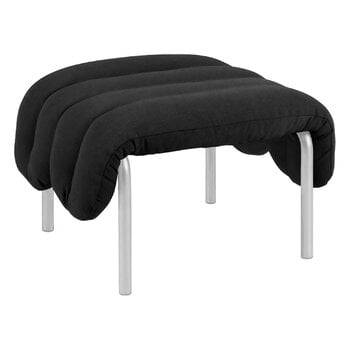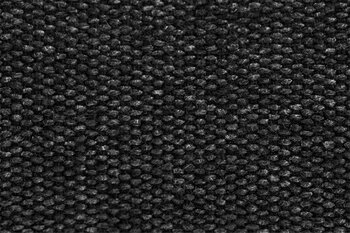The Puffy ottoman by Hem charms with a delightful contrast of forms and materials. Designed by Faye Toogood, Puffy consists of a streamlined, tubular steel frame and a plump, detachable upholstery that rests freely on the frame. The playful appearance of the Puffy ottoman adds a relaxed touch to a living room or lobby, and its airy design easily blends into any kind of decor, minimalist or maximalist. Available in a range of colour and upholstery options.
Puffy ottoman, anthracite - stainless steel
Hem
Description
The Puffy ottoman by Hem charms with a delightful contrast of forms and materials. Designed by Faye Toogood, Puffy consists of a streamlined, tubular steel frame and a plump, detachable upholstery that rests freely on the frame. The playful appearance of the Puffy ottoman adds a relaxed touch to a living room or lobby, and its airy design easily blends into any kind of decor, minimalist or maximalist. Available in a range of colour and upholstery options.
Product details (10)
- Colour
- Anthracite, stainless steel
- Width
- 67 cm
- Depth
- 58 cm
- Height
- 42 cm
- Frame material
- Sand blasted stainless steel
- Seat cushion
- 50% PU foam, 50% ball fiber
- Upholstery fabric
- Chioccarello / Disco Coex Number 26: 70% cotton, 20% acrylic, 5% viscose, 5% linen
- Abrasion resistance
- 50,000 Martindale
- Pilling
- 4-5
- Lightfastness
- 4-5
- Product ID
Designer
Faye Toogood is a British artist and designer whose work ranges from sculptures and fine art to furniture and fashion design. Toogood founder her own studio in London in 2008, and her works have been included in permanent collections of many museums, including the Philadelphia Museum of Art, Corning Museum of Glass in New York and National Gallery of Victoria in Melbourne.
View all productsReviews (0)
Sustainability
The Product Sustainability Framework, our criteria of sustainable design, helps you find the most sustainable products in our selection. Read below which sustainability criteria this product has met.
Working conditions & labour 8/9
-
Equal opportunities for all employees
-
Commitment to UN Global Compact, fair compensation for all employees
-
Corporate responsibility requirements defined and communicated for suppliers
-
Systematic work for improved inclusion and well-being in the workplace
-
Transparent supply chain
-
Suppliers' compliance to a code of conduct ensured
-
Compliance to the UN Guiding Principles on Business and Human Rights ensured in the supply chain
-
Support for community involvement in the supply chain
-
Direct suppliers audited and certified
Eco-friendly production 8/9
-
Fair and resource-wise water-use in production
-
No incineration or landfilling of returned items
-
No use of endangered species as materials
-
No direct environmental emissions or waste (excl. GHGs) from production
-
The sustainability of direct suppliers' production is addressed and monitored
-
Production and material sourcing that respect biodiversity, animal rights, and natural ecosystems
-
Material-efficient and ecological packaging
-
No potentially harmful chemicals used in own production
-
Positive impact on nature’s well-being through operations that regenerate natural ecosystems
Climate impact 4/8
-
Company's direct greenhouse gas emissions identified and commitment to reduction
-
Product's carbon impact identified and commitment to reduction
-
Guidance on energy- and eco-efficient use of the product
-
100 % renewable energy in own production and operations
-
Contribution to climate initiatives beyond the brand’s direct operations
-
Low-carbon or compensated transportation
-
Carbon footprint of the product calculated and goals set to reduce it
-
Carbon neutral or carbon negative product
Sustainable materials 5/6
-
Sustainable and long-lasting material choices
-
No harmful or hazardous substances
-
Responsible raw material sourcing and production
-
Materials suited for circularity: monomaterials, recyclable finishings, renewable or recycled contents etc.
-
Ecological materials: natural, biodegradable, recyclable or recycled contents
-
Outstanding materials in terms of innovativeness, responsibility, sustainability and circularity: local production or sourcing, 100 % recycled content, C2C-certification etc.
Circular design 4/5
-
High aesthetic quality promoting long-term use of the product
-
Technically durable product design and material choices
-
Design for enduring life-long quality
-
Design and support for product maintenance, repair and upgradability
-
Innovative circular design solutions: circular service system, resale platform, remanufacturing, collection of used products, etc.






